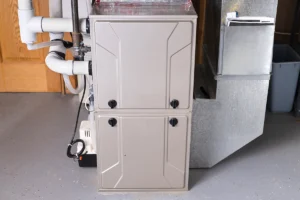If you’ve ever looked into heating and cooling options, you’ve probably heard about the dual fuel heat pump. Homeowners are curious because it promises the best of both worlds — the efficiency of an electric heat pump and the power of a gas furnace. But does it really deliver? Let’s walk through the pros and cons from the perspective of someone who works on these systems every day.
What Is a Dual Fuel Heat Pump?
A dual fuel heat pump is basically a hybrid system. Most of the time, it runs on electricity, pulling heat from outside air and transferring it indoors. But when temperatures drop really low, the gas furnace kicks on. That way, you’re not stuck with an electric system that struggles in freezing weather.
Think of it like driving a hybrid car — electric most of the time, gas when you need more muscle.
Pros of a Dual Fuel Heat Pump
Lower Energy Bills
One of the biggest advantages is efficiency. In mild weather, the system uses the electric heat pump. That keeps your energy bills low because it doesn’t rely on gas until it needs to. The U.S. Department of Energy notes that today’s heat pump can cut electricity use for heating by up to 75% compared to electric resistance heating, like furnaces or baseboard heaters.
Year-Round Comfort
The dual fuel heat pump gives you reliable heating in the winter and efficient cooling in the summer. Instead of switching between two totally separate systems, it’s all built in. (That means fewer control panels to confuse the family with — I’ve seen more thermostat battles than I can count.)
Flexibility in Cold Climates
For folks who live in areas where winters get harsh, this is a game-changer. The electric heat pump works best above 35–40°F. Below that, the gas furnace kicks in seamlessly. No guesswork for the homeowner — the system decides when to switch.
Long-Term Value
Yes, the upfront cost is higher than a single furnace or heat pump. But you may see savings over time with lower energy use, fewer emergency repairs, and longer equipment life.
Cons of a Dual Fuel Heat Pump
Higher Installation Cost
There’s no sugarcoating it — a dual fuel heat pump costs more upfront than a traditional furnace or single heat pump. It’s an investment, and not every homeowner is ready for that.
Maintenance Needs
Because you’ve got two systems working together, you’ll need regular maintenance for both the furnace and the heat pump. Skipping tune-ups can lead to efficiency losses or breakdowns. (I like to joke that systems are like cars — don’t skip the oil change and expect them to run forever.)
Not Always Necessary in Mild Climates
In parts of the country where winters rarely dip below freezing, a standard heat pump might be enough. The furnace backup won’t kick on often, so some homeowners may not see a big return on the extra cost.
Space Considerations 
Since you’re essentially housing two systems in one, space can sometimes be a factor. Not every utility closet or attic is ready for the setup.
Is a Dual Fuel Heat Pump Right for You?
The answer depends on your climate, your home, and your energy goals. If you live somewhere with cold winters, the dual fuel heat pump offers peace of mind and lower long-term costs. But if you’re in a milder area, you might not need the furnace backup at all.
The best step is always to have a professional evaluate your home’s needs. At Summers Comfort Heating & Air, we walk homeowners through the options — from initial cost to lifetime savings — so you can make the right call.
Preventing Problems With Regular Maintenance
Like any HVAC system, regular care keeps it running at peak efficiency. Changing filters, keeping outdoor units clear of debris, and scheduling seasonal tune-ups make a big difference. The ENERGY STAR maintenance checklist is a great reference for homeowners. For more practical, hands-on advice, check out our own blog on heat pump maintenance.
Most of the major repairs I run into could’ve been avoided with simple routine maintenance.
When to Call Summers Comfort Heating & Air
If you’re considering a dual fuel heat pump, or you’ve noticed issues with the one you already have, schedule professional heat pump repair with Summers Comfort Heating & Air before winter hits. We install, repair, and maintain these systems every day. Our team will explain your options clearly and help you find the solution that makes the most sense for your home.
Final Thoughts on the Dual Fuel Heat Pump
A dual fuel heat pump combines the efficiency of an electric system with the power of a furnace when you need it most. The pros include energy savings, comfort, and flexibility, while the cons come down to cost and maintenance.
At Summers Comfort Heating & Air, we’re here to help homeowners across Gastonia and the surrounding areas get the most out of their heating and cooling systems. Contact us today to schedule service or learn whether this type of system is right for your home.

